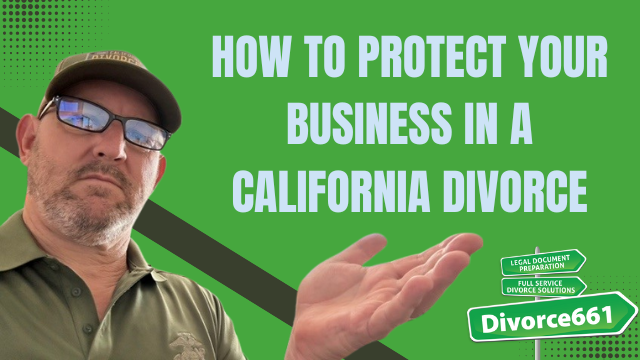How to Protect Your Business in a California Divorce
If you own a business and are facing divorce in California, one of the biggest worries is often simple and direct: will I lose part of my business? California is a community property state, and how your business is treated in a divorce depends on when it was started, how it grew during the marriage, and how clearly you can trace separate contributions.
How California law treats business interests
Under California law, property acquired or increased in value during the marriage is presumed to be community property. That means if your business was started or expanded while you were married, your spouse could have a legal right to a portion of its value—even if their name is not on any paperwork.
“If your business was started or grew during the marriage, it may be considered community property.”
The essential task is to determine what portion of the business is community property and what portion is separate property. This split guides how assets are divided, whether through negotiation, buyout, or court proceedings.
Separate property versus community property: what to look for
Key distinctions and evidence to consider:
- When the business began. A business established before marriage is presumptively separate property, but that presumption can be reduced if the business increased in value due to efforts or resources during the marriage.
- Contributions during the marriage. Time, labor, capital injections, and business expansion that occur during marriage often create community property interest in the increased value.
- Financial tracing. Clear documentation showing separate funds or separate efforts can support a claim of separate property for portions of the business.
- Agreements. Prenuptial or postnuptial agreements and buy-sell or shareholder agreements can govern division and protect business ownership when properly drafted and executed.
Why valuations matter
A business valuation is often the most critical piece of the puzzle. A qualified valuation expert can separate overall value into components attributable to separate versus community contributions. That valuation becomes the foundation for any buyout, offset, or division strategy.
Typical valuation outcomes include:
- Identifying the portion of the company attributable to efforts and capital before the marriage (separate property)
- Identifying growth or value created during the marriage that is community property
- Providing a fair market value used in buyouts or offsets with other marital assets
Real client example
We recently worked with a client who owned a small consulting firm. He started the business before the marriage but expanded it significantly during the relationship. Rather than litigate over ownership, we retained a valuation expert to identify the portion of the business that was community property.
With the valuation in hand, we helped structure an agreement that allowed him to keep the business while buying out his spouse’s share. The result was a practical solution that preserved the company and fairly compensated the spouse for the community interest.
Practical steps to protect your business during divorce
Whether you want to keep the company or ensure a fair division, take these steps early:
- Document everything. Maintain thorough records of when the business started, capital contributions, invoices, payroll, and any separate funds used.
- Get a professional valuation. Early valuation helps set expectations and provides the evidence needed for negotiation.
- Trace separate property. If the business began before marriage or uses separate funds, gather documentation that proves separate ownership or contributions.
- Consider settlement options. Buyouts, offsets with other marital assets, and structured payments can allow an owner to retain the business.
- Use agreements. Draft clear settlement agreements and, where appropriate, shareholder or operating agreements that reflect the divorce settlement and protect future operations.
- Work with experienced professionals. You will likely need an attorney familiar with business division, a valuation expert, and potentially a forensic accountant.
How to approach negotiations
A collaborative approach often yields the best outcome for business owners. Focus on:
- Using an independent valuation so both sides trust the numbers
- Exploring creative settlement structures so the business can continue operating without disruption
- Protecting confidentiality and client relationships during the process
What we do to help business owners
We guide business owners through disclosure requirements, coordinate professional valuations, and prepare settlement agreements that are fair and court-approvable. Our goal is to protect the company you built while achieving an equitable result for both parties.
Services that typically help: comprehensive disclosures, working with valuation experts, structuring buyouts or offsets, drafting court-ready settlement agreements, and offering flat-fee options so you know costs up front.
Next steps
If you own a business and are facing divorce in California, start by gathering business records and seeking a consultation with experienced counsel and valuation professionals. Early action and good documentation dramatically improve your ability to protect your company.
For a free consultation, visit divorce661.com and schedule a time to discuss your situation and options. We will help you move forward with clarity and confidence.


